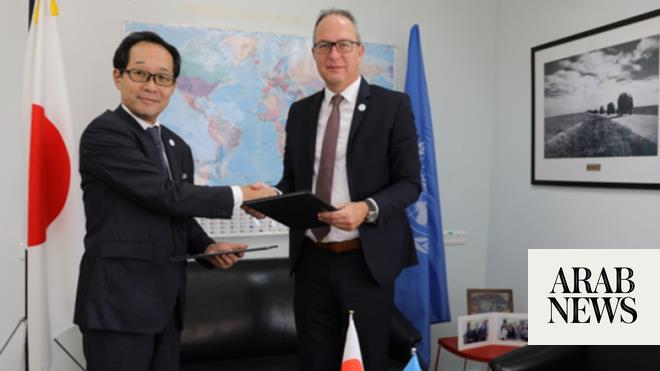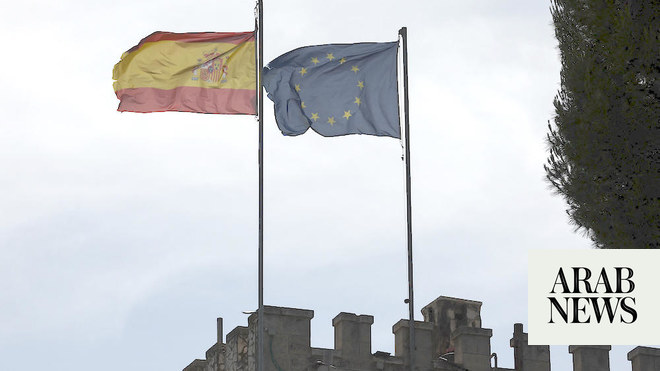
The sixth international conference on Syria will be organised in early May in Brussels to discuss the issue of Palestinian refugees in Syria and their return to the demolished houses in the Yarmouk refugees camp
RAMALLAH: The Palestinians are profoundly concerned by UNRWA Commissioner-General’s declarations that the organisation will delegate its humanitarian services for 5 million Palestinian refugees living in 58 refugees camps to other organisations to overcome its severe financial crisis, Palestinian sources confirmed to Arab News on Sunday.
The UNRWA Commissioner-General Philippe Lazzarini said in a letter to the Palestinian refugees dated April 23: “This year, a very harsh winter and the impact of the war in Ukraine on prices of food and fuel in the region add to the daily hardship you are facing. I witnessed this firsthand a few days ago when I met with Palestine refugees in Khan Danoun Camp and Yarmouk in Syria, many refugees shared with me their struggle to meet their basic needs and how the socio-economic situation compels them to return to live amid the rubble in Yarmouk.”
He indicated the economic hardship the Palestinian refugees suffer in the West Bank, Gaza Strip, Jordan and Lebanon, due to security and unstable economic situations in those countries.
“The painful reality is that in the last ten years, and despite immense outreach and fundraising efforts, the resources available to UNRWA have stagnated, while the needs of Palestine refugees and cost of operations keep increasing,” Lazzarini said. “The now chronic underfunding of UNRWA is the result of a combination of shifting geopolitical priorities, new regional dynamics and the emergence of new humanitarian crises compounded by donor fatigue for one of the world’s longest unresolved conflicts. All these have led to a clear de-prioritization of the Palestinian issue, including most recently among some donors from the Arab region.”
HIGHLIGHT
The international organization has provided its services to 7 million Palestinian refugees living in Palestinian refugee camps in the West Bank, Gaza Strip, Jordan, Syria and Lebanon since 1948, with a noticeable reduction in the quality and quantity of those services.
The international organisation has provided its services to 7 million Palestinian refugees living in Palestinian refugee camps in the West Bank, Gaza Strip, Jordan, Syria and Lebanon since 1948, with a noticeable reduction in the quality and quantity of those services.
“UNRWA has also increasingly been exposed to domestic politics in some of its traditional donor countries. Coordinated campaigns by organisations that aim to delegitimise and defund the Agency and erode the rights of Palestine refugees have increased in frequency and aggressivity,” the letter said.
Meanwhile, the UNRWA Commissioner-General toured several countries recently to recruit financial resources to enable the UNRWA to continue providing its services to Palestinian refugees, but no information regarding the outcome of his tour.
The sixth international conference on Syria will be organised in early May in Brussels to discuss the issue of Palestinian refugees in Syria and their return to the demolished houses in the Yarmouk refugees camp. In June, the Advisory Commission on UNRWA is gathering its major donors and hosts in Lebanon to discuss fundraising for the UN agency.
The Palestinians view with concern any step that affects the status and role of the UNRWA, transforming the Palestinian refugee issue into an issue of relief services, health and education and ignoring its political dimension related to the right of refugees to return to their homes from which they were displaced, with compensation.
The Joint Refugee Committee called on the UNRWA Commissioner-General to search for creative and innovative ideas on recruiting financial support to fund services and not to search for ideas that intersect with the American and Israeli proposals that call for the gradual termination of UNRWA.
The PLO Department of Refugee Affairs categorically rejected the ideas contained in the letter. It said in a press statement on Sunday: “We express our shock at what was stated in the UNRWA Commissioner-General’s letter about his acceptance of transferring some of UNRWA’s powers to other international organisations to carry out them on its behalf, as one of the options presented to ensure the continuity of its services to Palestinian refugees without the threat of interruption due to UNRWA’s lack of financial resources.”
The Head of the Refugee Affairs Department at the PLO, Ahmed Abu Holy, said that “it is not within the authority of the Commissioner-General of UNRWA to propose solutions to address the financial deficit in the UNRWA budget that affects UNRWA’s work mandate, and he does not have the mandate to transfer UNRWA’s powers to other international organisations under the slogans of partnerships and synergy with UNRWA, whose slogans carry in its secret political dimensions to liquidate UNRWA and transfer its powers to international organisations and the governments of the host countries.”
He said that the Palestinian leadership is consulting with all concerned parties, including UNRWA, donor countries and members of the Advisory Committee, in search of innovative models for boosting UNRWA’s financial resources by finding new funders, urging traditional donors to increase their funding and communicating with international organisations, such as the World Bank, and the Organization of Islamic Cooperation and not by transferring the powers of UNRWA to other international organisations.
He said the commissioner-general’s proposal for solutions could not be justified, knowing that it would prompt adverse reactions from Palestinian refugees, UNRWA staff and host countries.
He called on the UN to allocate an independent budget to UNRWA, similar to other United Nations institutions, to ensure the continuation of its relief and operational services to Palestinian refugees until a just solution is found.
The commissioner-general’s letter came three weeks before the Palestinian commemoration of the Nakba, the Palestinian Catastrophe, on May 15.











